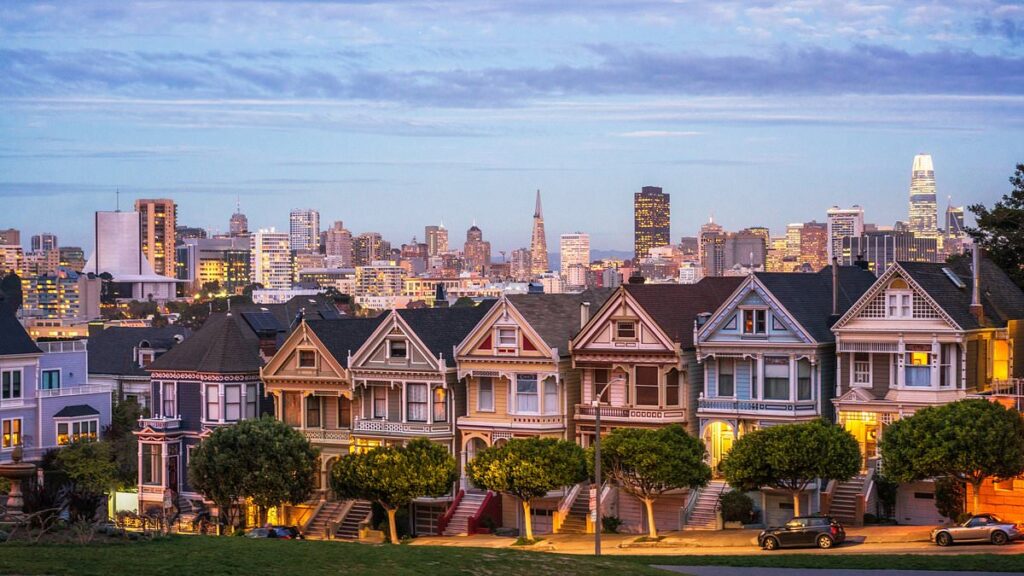San Francisco was forced into admitting an embarrassing U-turn after plans emerged to charge homeowners and business for having a driveway.
City officials were seriously considering the $100 per year charge to help pay for mini bus and rail services, according to records reviewed by the San Francisco Chronicle.
The city ultimately scrapped the concept, which is strikingly similar to New York City’s controversial congestion pricing brought in to fund subway improvements.
Both ideas penalize people who drive cars under the assumption that residents will one day get around using only public transport.
The driveway fee in San Francisco was first proposed in April by the Muni Funding Working Group, a task force formed to come up with new revenue sources to cover the Municipal Transportation Agency’s $322 million budget deficit.
Even if San Francisco officials are as determined as New York officials have been to get congestion pricing through, it will likely take them years to weave through California’s complicated bureaucracy.
Congestion pricing in New York took years to come to fruition, with former Mayor Michael Bloomberg being the first to propose something resembling the current plan in 2007.
Former Governor Andrew Cuomo and former Mayor Bill De Blasio first striking a deal on it in 2019. It only went into effect in January of this year before President Donald Trump stepped in to stop the tax, which is currently being litigated in court.
Officials within San Francisco’s Municipal Transportation Agency proposed charging anyone who has a driveway $100 per year. It was an idea to help alleviate the agency’s $322 million budget deficit
Similar to New York City’s congesting pricing plan, San Francisco’s driveway fee would have gone toward improving city buses and light rail
If the plan had been implemented, anyone who owned a property that has a ‘curb cut’ in the public sidewalk in front of their driveway would have had to pay the fee
A spokesperson for the Municipal Transportation Agency told the Chronicle that charging people for their driveways isn’t an idea that’s ‘on the table’, while other staff at the agency said such a policy would run into significant legal and administrative barriers.
The fee would have to be approved by the agency’s board of directors. Then, if the fee were considered a new tax, it would have to be put in front of voters.
Still, the working group put together a report detailing how it would have worked had it been implemented.
Anyone who owned a property that has a ‘curb cut’ in the public sidewalk in front of their driveway would have had to pay the fee.
The city ‘likely has more private driveway curb cuts than any other city of its size and density, since most east coast cities of similar density make more use of back alleys for trash and car access,’ representatives from the working group wrote in the report.
‘These curb cuts are essentially permanent privatization of public space,’ the report continued.
‘Charging an annual fee to the owners of curb cuts would put a fair price on this privatization of public space, encourage owners whose curb cuts no longer lead to active driveways to return those curb cuts to the public, and generate significant revenue for the agency.’
Willie Brown, the veteran Democrat who served as San Francisco’s mayor from 1996 to 2004, blasted the plan as ‘nonsense’
One proponent of the plan said allowing homeowners and businesses to have a sloped curb for free is subsidizing car owners at the expense of people who get around by other means
An economic analysis from the city estimated that San Francisco has 196,000 curb cuts that would have generated $19.6 million annually at $100 apiece.
Officials noted that they’d have to subtract $3 million from that total for administrative and staffing costs related to collecting the fees from homeowners.
Willie Brown, the veteran Democrat who served as San Francisco’s mayor from 1996 to 2004, blasted the plan as ‘nonsense.’
‘What kind of nonsense is this?’ the 91-year-old said. ‘If any member of the working group wants to donate $100 a year to fund Muni, they can do that. They shouldn’t have the rest of us donate by being penalized for having a driveway.’
Professor Daniel Sperling, director of the Institute of Transportation Studies at UC Davis, had a slightly different take on the driveway fee.
Sperling told the Chronicle that he thought of it more as a property tax hike, which cities frequently do to fund things like schools and libraries.
Driveway fees are ‘a more equitable way to use public space,’ according to Luke Bornheimer, executive director of Streets Forward, a nonprofit that promotes cycling, walking and transit.
Bornheimer told the Chronicle that allowing homeowners and businesses to have a sloped curb for free is subsidizing car owners at the expense of people who get around by other means.
Although Sperling views the driveway fee in a more innocuous light than others, he acknowledged that residents likely wouldn’t be in favor of paying another tax.
